Blog
Cerebus re-read 2015–2016: Melmoth
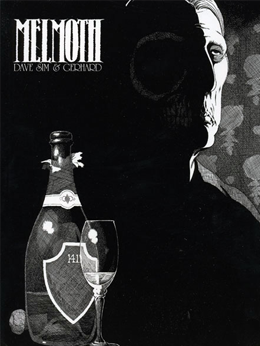 While researching Oscar Wilde for Jaka’s Story, Dave was sufficiently inspired by what he read to devote an entire storyline to the author/playwright, and in the process, befuddle fans of the book by giving Cerebus even less to do than in the previous 34 issues. As if that wasn’t enough, he confused longtime readers even further by making it clear that this wasn’t the same Oscar Wilde from Jaka’s Story. Of course, Oscar had been taken away by the Cirinists at the end of that book, so he was a bit busy at the time. Luckily for Dave, there just so happened to be another author in Estarcion with the exact same name, appearance, and ready wit. Lucky for us, too, because this is a fantastic, haunting work that never fails to grip my heart. This may be because this is the first time that Cerebus has flirted with non-fiction, as Melmoth is the story of the real Oscar Wilde’s final days.
While researching Oscar Wilde for Jaka’s Story, Dave was sufficiently inspired by what he read to devote an entire storyline to the author/playwright, and in the process, befuddle fans of the book by giving Cerebus even less to do than in the previous 34 issues. As if that wasn’t enough, he confused longtime readers even further by making it clear that this wasn’t the same Oscar Wilde from Jaka’s Story. Of course, Oscar had been taken away by the Cirinists at the end of that book, so he was a bit busy at the time. Luckily for Dave, there just so happened to be another author in Estarcion with the exact same name, appearance, and ready wit. Lucky for us, too, because this is a fantastic, haunting work that never fails to grip my heart. This may be because this is the first time that Cerebus has flirted with non-fiction, as Melmoth is the story of the real Oscar Wilde’s final days.
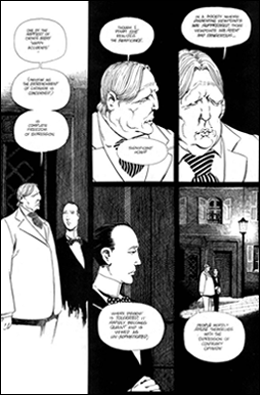 The story focuses on Wilde following his release from two years’ hard labor. Dave scripts some speculative conversation at the beginning of the book, in which Wilde discusses with Robert Ross the works of his similarly-named peer (“Jaka’s Story” having been renamed “Daughter of Palnu,” likely against the author’s intentions, Oscar asserts), as well as the state of publishing in the now Cirinist-run Iest. From there, Sim hands the writing over to Ross and Reggie Turner, which takes the form of actual letters that the two friends sent back and forth as they took it in turns to care for a rapidly declining Wilde, who is staying in a hotel in lower Iest. Dave typesets the text above beautifully rendered, mostly sequential illustrations of the contents of the letters. These sequences are incredibly effective because they are handled so respectfully by Dave and Gerhard. None of it is played for laughs (except the occasional Wilde witticism), and it’s free to be as dark and disturbing as is necessary to fully depict the emotional weight that Ross and Turner must have been carrying as they watched their friend die.
The story focuses on Wilde following his release from two years’ hard labor. Dave scripts some speculative conversation at the beginning of the book, in which Wilde discusses with Robert Ross the works of his similarly-named peer (“Jaka’s Story” having been renamed “Daughter of Palnu,” likely against the author’s intentions, Oscar asserts), as well as the state of publishing in the now Cirinist-run Iest. From there, Sim hands the writing over to Ross and Reggie Turner, which takes the form of actual letters that the two friends sent back and forth as they took it in turns to care for a rapidly declining Wilde, who is staying in a hotel in lower Iest. Dave typesets the text above beautifully rendered, mostly sequential illustrations of the contents of the letters. These sequences are incredibly effective because they are handled so respectfully by Dave and Gerhard. None of it is played for laughs (except the occasional Wilde witticism), and it’s free to be as dark and disturbing as is necessary to fully depict the emotional weight that Ross and Turner must have been carrying as they watched their friend die.
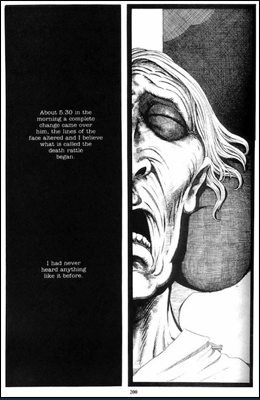 The book is able to reach this darkness because there is, in fact, some comic relief. Cerebus, believing Jaka to be dead after the Cirinist ransacking of her home and workplace, is in a near catatonic state. He still has his single gold coin, and offers it to Dino, the proprietor of a cafe/hotel next door to Oscar’s in exchange for lodging and food for the rest of his life. So in between sequences of Oscar’s decline, Cerebus sits on the porch right next door, blankly staring out into the lower city while familiar characters walk by with various degrees of acknowledgement of him. One of the funnier instances is the reappearance of Princes Mick and Keef, who were able to escape Cirinist punishment by agreeing to marry the Buttock sisters, a fate which seems to be just barely the lesser of two evils. Following Oscar’s death, two Cirinists stand in front of Dino’s Cafe, one advising the other on prisoner discipline with her story of how violently she treated Jaka while she was in custody. This snaps Cerebus out of his catatonia very quickly, and he kills both Cirinists on the spot. He then remembers Bear telling him many years ago about how Cirinists somehow have a hive-mind, and that if Bear had ever killed a Cirinist, he’d kill himself immediately rather than experience the wrath of the inevitable swarm of vengeance. Cerebus nearly follows through with this (with the Judge’s forecast of lonely end echoing in his mind), but a group of Cirinists interrupts him, having somehow felt the death of their two comrades, and Cerebus chooses to run instead.
The book is able to reach this darkness because there is, in fact, some comic relief. Cerebus, believing Jaka to be dead after the Cirinist ransacking of her home and workplace, is in a near catatonic state. He still has his single gold coin, and offers it to Dino, the proprietor of a cafe/hotel next door to Oscar’s in exchange for lodging and food for the rest of his life. So in between sequences of Oscar’s decline, Cerebus sits on the porch right next door, blankly staring out into the lower city while familiar characters walk by with various degrees of acknowledgement of him. One of the funnier instances is the reappearance of Princes Mick and Keef, who were able to escape Cirinist punishment by agreeing to marry the Buttock sisters, a fate which seems to be just barely the lesser of two evils. Following Oscar’s death, two Cirinists stand in front of Dino’s Cafe, one advising the other on prisoner discipline with her story of how violently she treated Jaka while she was in custody. This snaps Cerebus out of his catatonia very quickly, and he kills both Cirinists on the spot. He then remembers Bear telling him many years ago about how Cirinists somehow have a hive-mind, and that if Bear had ever killed a Cirinist, he’d kill himself immediately rather than experience the wrath of the inevitable swarm of vengeance. Cerebus nearly follows through with this (with the Judge’s forecast of lonely end echoing in his mind), but a group of Cirinists interrupts him, having somehow felt the death of their two comrades, and Cerebus chooses to run instead.
I always really liked this storyline because it was such a departure from Cerebus‘ story, and it was a good example of Dave’s storytelling skill even when he wasn’t working with his own characters. I know for a lot of people, it was a bit frustrating having Cerebus as a supporting character for 45 issues, but it obviously makes the conclusion of this book exceptionally intense. I think, too, that we all maybe needed a bit of a break from the aardvark after finding out just how terrible he really is. However, it was a harbinger of things to come—Dave would come to see Cerebus as a bit of a public forum for his own opinions, eventually to the detriment of a large portion of his reader base.
Because the writing is mostly from other sources, it’s the art that really carries this story. Letters, of course, don’t detail facial expressions, scenery, or even necessarily the true feelings of the writer, so Dave and Gerhard had their work cut out for them in interpreting the material. In Dave’s case, his predilection for reading between the lines may have begun here, and he would make full use of it on his current project, The Strange Death of Alex Raymond (currently on hold). He also begins to employ a new technique which would become more prominent in the upcoming books, wherein he uses a series of curved lines around the details of furrowed brows and other features to create a sort of half-contouring, half-shading effect, something that is one of the most distinctive characteristics of his character work in the second third of the book, especially as it becomes more pronounced toward the end of Mothers & Daughters.
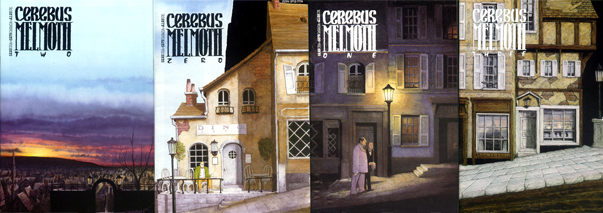
Much in the same way that Woody Allen’s Manhattan sought to make that film’s namesake a character in the movie, Gerhard really shines with the backgrounds here. There are some terrific slow tracking shots across the scenery, and some lovely wide shots that make you feel as if you’re sitting in the bushes watching the story happen in real time. But perhaps the most effective technique Gerhard employs is the soft encroachment of the white space into the panels’ real estate during the Wilde sequences, meant to represent Oscar’s clouded mind and his drifting in and out of consciousness. It’s quite moving, tremendously evocative, and even a little scary, especially as it gets close to tunnel vision. One can put oneself in Oscar’s place very easily, and that’s not a comfortable position to be in.
I’d like to make special mention of the logo for Melmoth, as it’s my favorite of all the books.
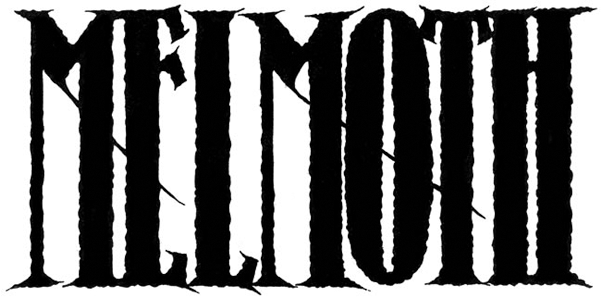
Top moments
Dave’s lettering of Oscar’s coughs
The fantastically cinematic tracking shots
“‘She’s the boss.’ Eh?”
Cerebus relenting and having an ale with his raw potato (NO butter, NO salt and pepper, NOT cut into sections, NOT on a plate)
Cerebus’ anger at not having a good morning wished to him
The panel timing while Cerebus’ has his sword to his own throat
For those who want to read along, the entire series is available as a digital download at Cerebus Downloads. (http://www.cerebusdownloads.com/index2v16s.html)

Recent Comments